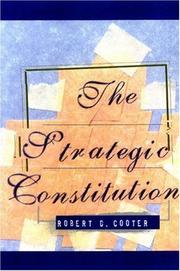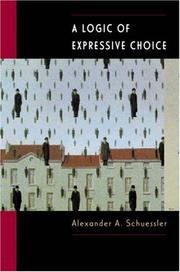| Listing 1 - 2 of 2 |
Sort by
|

ISBN: 0691096201 0691058644 0691214506 Year: 2002 Publisher: Princeton, N.J. Princeton University Press
Abstract | Keywords | Export | Availability | Bookmark
 Loading...
Loading...Choose an application
- Reference Manager
- EndNote
- RefWorks (Direct export to RefWorks)
Making, amending, and interpreting constitutions is a political game that can yield widespread suffering or secure a nation's liberty and prosperity. Given these high stakes, Robert Cooter argues that constitutional theory should trouble itself less with literary analysis and arguments over founders' intentions and focus much more on the real-world consequences of various constitutional provisions and choices. Pooling the best available theories from economics and political science, particularly those developed from game theory, Cooter's economic analysis of constitutions fundamentally recasts a field of growing interest and dramatic international importance. By uncovering the constitutional incentives that influence citizens, politicians, administrators, and judges, Cooter exposes fault lines in alternative forms of democracy: unitary versus federal states, deep administration versus many elections, parliamentary versus presidential systems, unicameral versus bicameral legislatures, common versus civil law, and liberty versus equality rights. Cooter applies an efficiency test to these alternatives, asking how far they satisfy the preferences of citizens for laws and public goods. To answer Cooter contrasts two types of democracy, which he defines as competitive government. The center of the political spectrum defeats the extremes in "median democracy," whereas representatives of all the citizens bargain over laws and public goods in "bargain democracy." Bargaining can realize all the gains from political trades, or bargaining can collapse into an unstable contest of redistribution. States plagued by instability and contests over redistribution should move towards median democracy by increasing transaction costs and reducing the power of the extremes. Specifically, promoting median versus bargain democracy involves promoting winner-take-all elections versus proportional representation, two parties versus multiple parties, referenda versus representative democracy, and special governments versus comprehensive governments. This innovative theory will have ramifications felt across national and disciplinary borders, and will be debated by a large audience, including the growing pool of economists interested in how law and politics shape economic policy, political scientists using game theory or specializing in constitutional law, and academic lawyers. The approach will also garner attention from students of political science, law, and economics, as well as policy makers working in and with new democracies where constitutions are being written and refined.
Public law. Constitutional law --- Political philosophy. Social philosophy --- Constitutional law --- Game theory. --- Law and economics. --- Philosophy. --- Dret constitucional --- Filosofia. --- Jim Crow laws. --- Pareto frontier. --- accountability: of legislators. --- agenda setting rules. --- bargaining, legislative. --- chaos theorem. --- commodity, contingent. --- condemnation doctrine. --- consequentialism. --- delegation game. --- discussion set. --- emergency doctrine. --- engorgement principle. --- hate speech. --- intransivity. --- judicial review. --- law merchant. --- matching grants. --- maximin. --- natural monopoly. --- patronage system. --- political speech. --- private bads. --- slavery. --- sub-majority rule. --- term limits. --- unicameralism. --- white flight. --- zero-sum game.

ISBN: 069100661X 0691006628 9780691006628 9780691006611 Year: 2000 Publisher: London : Princeton University Press,
Abstract | Keywords | Export | Availability | Bookmark
 Loading...
Loading...Choose an application
- Reference Manager
- EndNote
- RefWorks (Direct export to RefWorks)
Alexander Schuessler has done what many deemed impossible: he has wedded rational choice theory and the concerns of social theory and anthropology to explain why people vote. The "paradox of participation"--why individuals cast ballots when they have virtually no effect on electoral outcomes--has long puzzled social scientists. And it has particularly troubled rational choice theorists, who like to describe political activity in terms of incentives. Schuessler's ingenious solution is a "logic of expressive choice." He argues in incentive-based (or "economic") terms that individuals vote not because of how they believe their vote matters in the final tally but rather to express their preferences, allegiances, and thus themselves. Through a comparative history of marketing and campaigning, Schuessler generates a "jukebox model" of participation and shows that expressive choice has become a target for those eliciting mass participation and public support. Political advisers, for example, have learned to target voters' desire to express--to themselves and to others--who they are. Candidates, using tactics such as claiming popularity, invoking lifestyle, using ambiguous campaign themes, and shielding supporters from one another can get out their vote even when it is clear that an election is already lost or won. This important work, the first of its kind, will appeal to anyone seeking to decipher voter choice and turnout, social movements, political identification, collective action, and consumer behavior, including scholars, graduate students, and upper-level undergraduates in political science, economics, sociology, anthropology, and marketing. It will contribute greatly to our understanding and prediction of democratic participation patterns and their consequences.
Rational choice theory --- Voting --- Political participation --- Rational choice theory. --- Social choice --- Ansolabehere, Stephen. --- Appadurai, Arjun. --- Bartels, Larry. --- Bonaccorso, John. --- Brennan, Geoffrey. --- Carter, Jimmy. --- Clinton, Bill. --- Diamond, Edwin. --- Durkheim, Emile. --- Edelman, Murray. --- Eisenhower, Dwight D. --- Ferejohn, John. --- Giddens, Anthony. --- Goodman, Robert. --- Haug, Wolfgang. --- Herbst, Susan. --- Hotelling, Harold. --- Iyengar, Shanto. --- Jamieson, Kathleen Hall. --- Johnson, Lyndon. --- King, Gary. --- Lennon, John. --- Lennons Problem. --- Lifestyle. --- Mickelson, Sig. --- Nagler, Jonathan. --- Nixon, Richard. --- Olson, Mancur. --- Page, Benjamin. --- Riker, William. --- Scib. --- Tedlow, Richard. --- Verba, Sidney. --- Walker, Mary. --- Wright, Gerald. --- abstention. --- bandwagons (momentum). --- biographical narratives. --- chaos theorem. --- commodification. --- composition of utility. --- electoral campaigns. --- expressive tipping model. --- free-riding. --- identity (attachment). --- marketing. --- opinion polls. --- paradox of participation. --- participation costs. --- public goods. --- rational ignorance. --- selective incentives. --- snob-good. --- turnout. --- Voting. --- Political participation. --- Balloting --- Polls --- Elections --- Politics, Practical --- Suffrage --- Citizen participation --- Community action --- Community involvement --- Community participation --- Involvement, Community --- Mass political behavior --- Participation, Citizen --- Participation, Community --- Participation, Political --- Political activity --- Political behavior --- Political rights --- Social participation --- Political activists
| Listing 1 - 2 of 2 |
Sort by
|

 Search
Search Feedback
Feedback About UniCat
About UniCat  Help
Help News
News